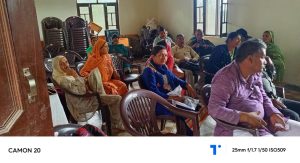
Nestled in the southern part of Himachal Pradesh, Sirmaur is a district known for its lush green landscapes, rich cultural heritage, and resilient communities. Yet, behind the scenic beauty lies a pressing need for sustainable development—a need that can’t be met by the government alone. This is where the role of grassroots NGOs and charitable trust in Sirmaur HP becomes crucial.
While many parts of urban India are witnessing rapid development, regions like Sirmaur often lag due to limited access to quality education, healthcare, employment, and infrastructure. Grassroots efforts led by local NGOs and charitable trusts can bridge this gap by addressing region-specific issues and empowering the local population.
The Ground Reality of Sirmaur
Sirmaur is largely a rural district, with agriculture being the primary occupation. The terrain and remote locations make access to public services difficult for many. Several areas lack proper roads, regular medical services, and quality education. Unemployment is a growing concern, especially among the youth and women, while many schools and primary health centers operate with minimal facilities.
The government has implemented various schemes for rural upliftment, but due to administrative limitations and the district’s tough geography, many initiatives fail to reach the grassroots. This calls for an increased role of charitable trust in Sirmaur HP and community-based NGOs who can act as catalysts for change.
The Power of Grassroots Organizations
Unlike larger organizations that often operate from a distance, grassroots NGOs and charitable trusts work at the village level. They understand the community, culture, and challenges better and can customize their interventions accordingly.
These organizations are uniquely positioned to:
- Conduct awareness programs on health, hygiene, and nutrition
- Promote education and distribute learning materials
- Train women and youth in skill development
- Provide career counseling and support to students
- Organize health camps and improve access to medical facilities
- Support organic farming and environmental conservation
By building trust within the community, they ensure that solutions are accepted and sustained in the long run.
Why More NGOs and Charitable Trusts Are Needed in Sirmaur
1. To Address Education Gaps
Despite government-run schools, many children in rural Sirmaur still drop out early due to lack of quality education, poor infrastructure, or family responsibilities. Several students are unaware of modern career options beyond traditional jobs.
Charitable trust in Sirmaur HP, such as Arjun Kirpal’s Compassion Trust, are already working to improve education through awareness, career counseling, and free learning resources. However, with over 900 villages in the district, more such organizations are required to make a widespread impact.
2. To Improve Healthcare Access
In many villages, people still walk several kilometers for basic medical treatment. Pregnant women, infants, and the elderly are especially at risk due to delayed healthcare.
Grassroots NGOs can organize free health check-ups, promote maternal health, and educate locals about preventive healthcare. Mobile health vans, telemedicine centers, and community health workers trained by charitable trusts can be life-saving in these remote areas.
3. To Uplift Women and Youth
Empowerment begins with awareness and skill-building. Women in rural Sirmaur often face multiple barriers—social, economic, and cultural. Youth struggle with unemployment and lack of direction.
A charitable trust in Sirmaur HP can run vocational training centers, workshops on self-employment, and programs on digital literacy to enable self-reliance. Empowered individuals not only improve their own lives but also uplift their families and communities.
4. To Promote Sustainable Agriculture and Livelihoods
Sirmaur’s economy is largely dependent on agriculture. However, due to climate change, erratic rainfall, and lack of modern farming techniques, farmers face losses.
Charitable trusts and NGOs can promote organic farming, educate farmers on sustainable techniques, and provide direct market access. Training in alternative livelihoods like bee-keeping, food processing, or eco-tourism can diversify income sources and reduce dependence on single-crop farming.
Arjun Kirpal’s Compassion Trust: A Model for Change
One example of an effective charitable trust in Sirmaur HP is Arjun Kirpal’s Compassion Trust (AKCT). The trust has been actively involved in:
- Organizing awareness programs for pregnant women
- Conducting educational sessions for children on nutrition and hygiene
- Providing guidance on career choices and mental well-being
- Supporting women empowerment through skill-based training
AKCT’s hands-on approach and continuous community engagement make it a role model for other NGOs to follow. But given the vast needs of the region, one trust alone cannot bring about the necessary transformation.
Collective Action for Sustainable Development
To ensure sustainable growth in Sirmaur, the participation of more charitable trusts and NGOs is essential. But so is the support of local bodies, schools, healthcare institutions, and the public.
Here are a few ways to encourage the development of more grassroots organizations:
- Encourage local youth to volunteer or start their own NGOs
- Offer government incentives or grants for NGOs working in remote regions
- Promote partnerships between existing NGOs and government departments
- Raise awareness about the impact of charitable trusts in rural areas
- Foster corporate social responsibility (CSR) contributions toward rural development
Conclusion
Sirmaur, with its untapped potential and vibrant communities, deserves equal opportunities for growth and development. While government programs provide the framework, it is the grassroots organizations that bring these initiatives to life.
The need for more charitable trust in Sirmaur HP is not just a call for more helping hands—it is a call for deeper empathy, localized solutions, and sustainable growth. These organizations not only fill the gaps left by systemic limitations but also empower individuals to dream, achieve, and transform their communities.
If we truly wish to build an inclusive and developed Himachal Pradesh, it begins with supporting and expanding the reach of grassroots NGOs and charitable trusts in districts like Sirmaur.


